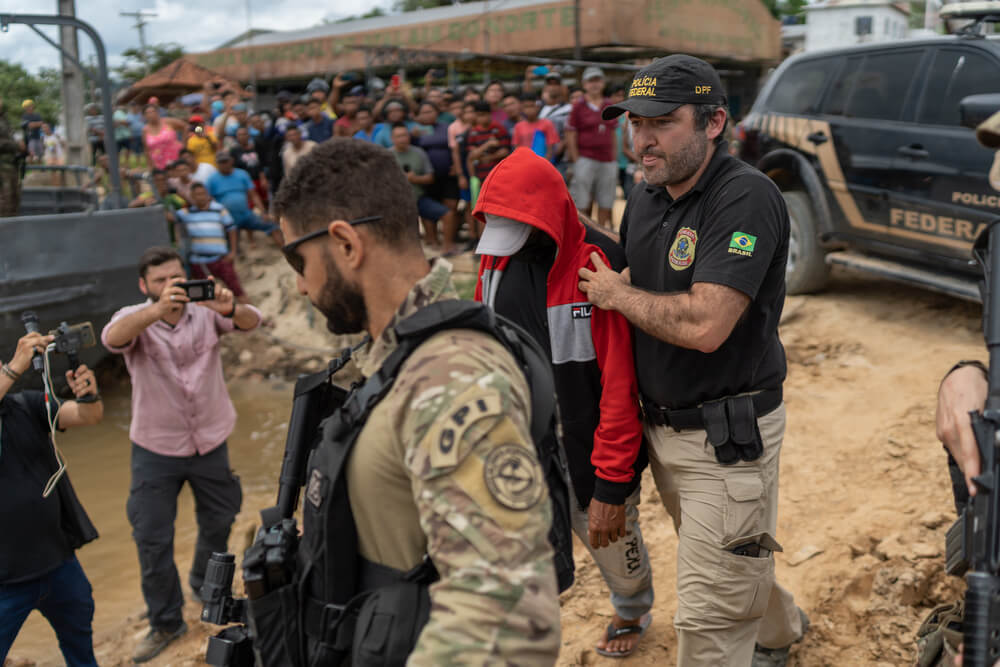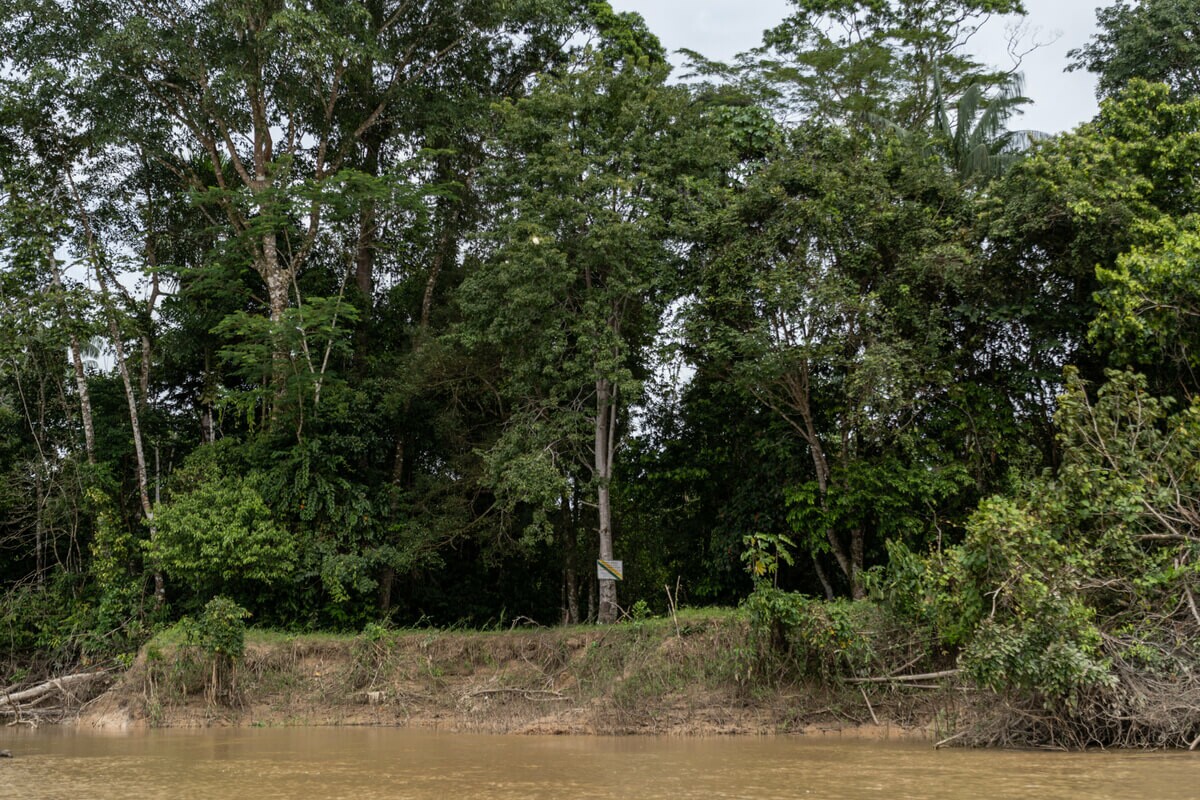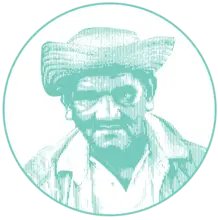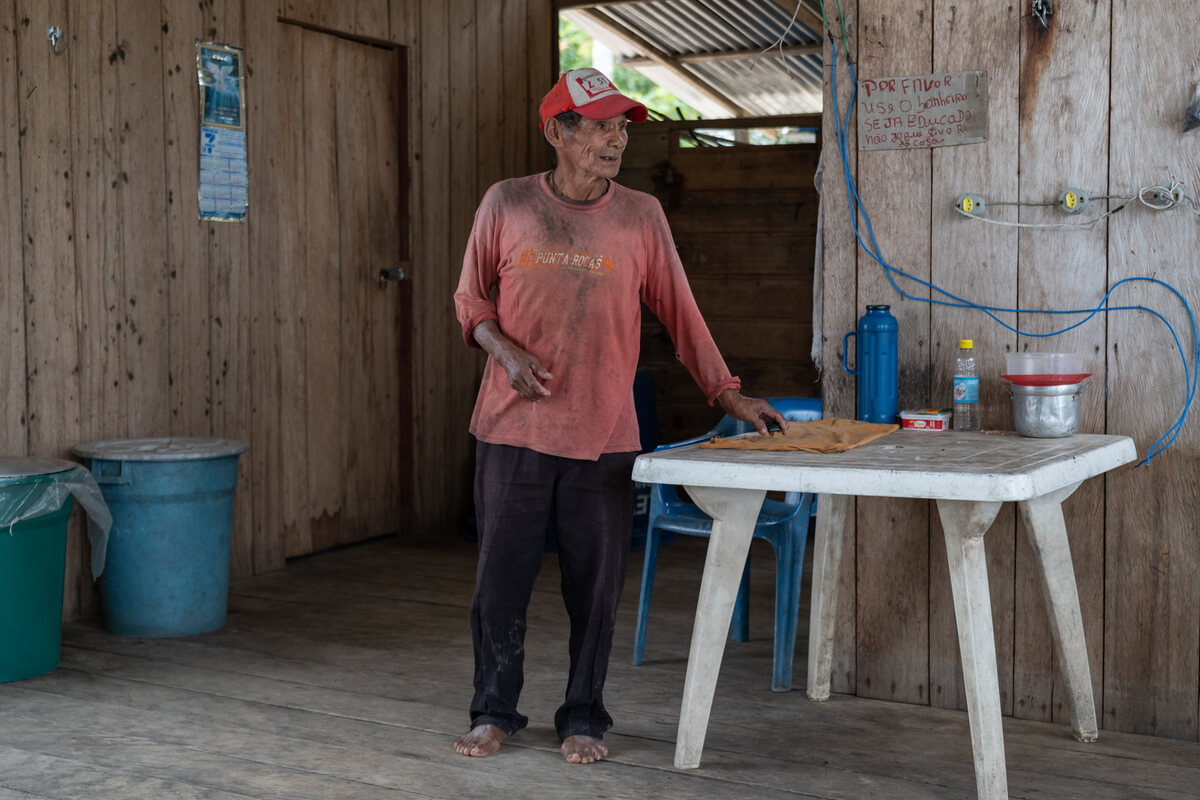The deaths of British journalist Dom Phillips and Brazilian Indigenous expert Bruno Pereira—confirmed by Brazil’s Federal Police on June 15, 10 days after their disappearance—drew the world’s attention to the threats faced by the Indigenous peoples of the Amazon, their allies, and environmental activists. The men were returning from a reporting trip in the Javari Valley, a remote Amazon area near the border with Peru and Colombia, when they vanished on the morning of June 5. Commenting on the case while the searches were still underway, Brazilian President Jair Bolsonaro said that Phillips and Pereira were on an “ill-advised adventure” when they disappeared—an attempt to shift the blame onto the victims.
Agência Pública retraced the last known movements of Pereira and Phillips before they disappeared on Sunday, June 5. The journey took place along the Itaquaí river from the region’s main urban center, Atalaia do Norte, a town of some 25,000 residents in Amazonas state, in northwest Brazil on the border with Peru.

A trip down the Itaquaí in this wide and clear stretch does not remotely resemble an “adventure.” It is a simple route, taken by dozens of Amazonians every day, including the elderly and children.
There is no imminent danger unless the traveler is an environmental and Indigenous protection agent. Pereira, who for more than nine years had been fighting for the preservation of the Javari Valley, was a talked-about target throughout the region.
The winding path of the Itaquaí river leads to the “mouth” of the Vale do Javari Indigenous Land, an 8.5-million-hectare ecological sanctuary the size of Portugal, demarcated in the 1990s and increasingly threatened by trespassers, religious missionaries, hunters, and illegal fishermen. Home to six different Indigenous ethnic groups and at least 16 isolated tribes, it is considered the largest concentration of isolated Indigenous peoples in the world.
Bruno and Dom left the port of Atalaia on June 2 on a small boat with a 40 HP engine. The journalist, who for years covered Brazil for several foreign media outlets, was doing research to write a book about preservation and sustainable development in the Amazon.
The duo’s first stop was a place known as “Ladário.” There are only two wooden houses on the right bank of the Itaquaí river. Bruno had arranged to buy 20 oars that would be distributed to the Indigenous inspection teams that he was helping to organize with the Union of Indigenous Peoples of the Javari Valley (Univaja), an entity representing Indigenous people in the area.

“He stopped here and [said] ‘my friend, where are my oars?’ I said, ‘Boy, I’m going to do it now,'” recalled carpenter Floriano Francisco da Costa, aka Gato. He spoke to Agência Pública as he worked on smoothing down a large piece of wood to build a boat. The production of the oars had stopped.

As a nonprofit journalism organization, we depend on your support to fund journalism covering underreported issues around the world. Donate any amount today to become a Pulitzer Center Champion and receive exclusive benefits!
Bruno and Dom entered the wooden house to have a coffee with the owners. “They were here for more than half an hour, he and the reporter were talking, and then he said ‘boy, let’s go.’ He shook my hand,” Gato continued. “Later [on Sunday], I didn’t see him ‘going down’ [returning to Atalaia], I was in bed, he passed by here about six o’clock in the morning, I only heard the engine.”
Leaving the port of Atalaia do Norte in a small motor boat, it takes about 1h40 minutes to reach the base of the FUNAI, the brazilian government body that establishes and carries out policies relating to indigenous peoples.
The base is the final point beyond which outsiders cannot go without FUNAI authorization. On the trip during which they disappeared, Bruno and Dom did not cross this limit, according to various witnesses, despite the allegations of Federal Police delegate Marcelo Xavier that the two had entered the Indigenous territory without authorization.
About 500 meters before the FUNAI base, a sign warns of the limits of the territory are under permanent protection by the federal government. Hunters have fired shots at the base at least five times in the last four years, an unmistakable sign of the upsurge in harassment over the coveted riches of the Indigenous territory, such as pirarucu and pacu fish, as well as turtles.
In the bend of the river before the border of the Indigenous land, there is a small wooden house with two rooms and a veranda built by a river dweller known in the region as Raimundinho, who has another house in Atalaia. Next to the little house, Univaja usually docks a raft with the resident’s permission. It is the main entrance to the so-called Jaburu Lake, where a fish management project is running. Raimundinho works as an “inspector” of the project.
The transfer of the so-called “Univaja base” from inside to outside the Indigenous territory was a decision Indigenous people took to try to stop the rapid encroachment on their territory. Bruno and Dom spent their last night before their disappearance here, at Raimundinho’s house.
The caretaker of Raimundinho house is João Guerrero, 77, from Peru. He told Agência Pública that Bruno and Dom slept in hammocks for two nights before returning to Atalaia on Sunday morning. On Saturday morning—as Indigenous people told the press on the condition of anonymity and repeated to the police—witnesses saw a group of fishermen, including Amarildo da Costa de Oliveira, aka Pelado, a fisherman who has been arrested in connection to the case, threatening an Indigenous inspection team that was investigating a complaint of illegal fishing in a lake in the region.

Pelado allegedly went as far as the sign delimiting the Indigenous land and displayed firearms to the Indigenous people - the family of the prisoner argues that he showed them a paddle. According to an Indigenous person who works with Univaja, who spoke on the condition of anonymity, the moment when the fishermen displayed the weapons was photographed with two cell phones by the Indigenous members of the surveillance team. These simple devices, distributed by the Univaja project precisely to catch irregularities within the territory, were later handed to Bruno so that he could make a formal report in Atalaia. The devices have disappeared. The Indigenous people also went to the FUNAI base in Ituí and reported the threat. When Pelado passed in front of Raimundinho’s house, his boat was also photographed by Bruno and Dom.
At Raimundinho’s house, where the pair spent the night in hammocks on the veranda, Guerrero, the caretaker, said that he was not aware of the threats. That night, they had fish and noodles for dinner. At dawn the next day, Bruno and Dom left for Atalaia. “They left here early, I heard him talking to Raimundinho, ‘I’m leaving, talk to the community.’ Sunday morning, five o’clock,” said the caretaker.
At this point, there are conflicting versions of events. A government official and friend of Bruno told Agência Pública, on the condition that his name not be published, that a few days earlier a councilman from Atalaia had told Bruno that the community of São Rafael would like to have a meeting with him about problems they were facing with a fish management project in the region. Bruno knew about the problems and wanted to offer help. And he also wanted to establish some sort of enforcement support against the invasion of Indigenous land. Before the trip began, however, news came that the meeting could no longer take place for reasons that are still unclear.
Bruno’s friend said that the Indigenous expert was frustrated with the news, as he also wanted to talk to the fishermen to try to reduce the increasingly serious tensions between the fishermen who insist on invading the Indigenous land and the enforcement agents and Indigenous people who protect the territory. The cancellation of the meeting, however, did not change the trip plan.
In São Rafael, Bruno was supposed to talk with community leader Manoel Sabino da Costa, aka Churrasco, 60 years old. His daughter Ana Carla Ramos da Costa, Moça, 31, who has lived in the community for 18 years, told a different story about the missed meeting. She said that her father received a message from his brother Raimundinho—the same Raimundinho who lends his house as a support point for Univaja—about a meeting with Bruno on Saturday June 4.
Moça said that her father waited for Bruno—meaning that he did not cancel the meeting. Since the Indigenous expert didn’t show up, said Moça, her father dedicated his Sunday to fishing and collecting açaí in a lake near the community.
On Sunday morning, around 6am, according to Univaja, Bruno arrived at the São Rafael community. At Churrasco’s house he only found his wife, Nira, Moça’s mother.
“He went upstairs, asked where dad was. He asked if mom could write. She said no. He asked mom for a notebook, wrote his [phone] number. He wanted to talk to dad when he ‘came down’ to Atalaia. We don’t know [the reason], he sent word that he wanted to have a meeting with the community,” said Moça. According to her, her father has lived in the same location for 49 years.
Another resident of the community, Sebastiana Capistrana Marques, aka Pequena, confirmed that Bruno “was at Nira’s. He had coffee with her…He passed by here, he went to Nira, looking for Churrasco, he was at the lake.”
Churrasco’s daughter said: “We weren’t angry with Bruno here in the community, that kind of thing, no, we weren’t. We were thinking ‘who has the courage to do this to this guy?’ It is such a strange thing, because we saw him ‘go down’ and then he disappeared. We imagine so many things, and even we, who are not close to him, are shaken.”
She said that she met Bruno only once, at the beginning of this year, when he went by the community and spoke with Churrasco. “He came talking to dad and said good morning to us there. He told dad that in April or May he was going to have another meeting, he wanted to talk to everyone.”
Moça said she knows the fisherman known as Pelado, who has been in jail since June 7, because he used to show up in the community on days of celebration. Pelado and his family members live in the São Gabriel community, about 10 minutes downriver.
Another resident of São Rafael, Ednei Pereira Campos, 25, said that he doesn’t know what the meeting with Bruno was supposed to be about, but that it was about “a help” for the community.
“We knew that he was interested in helping us here. He certainly stopped here to set up a meeting with the community. But he wanted to talk to the president, Churrasco. Precisely because of the invaders, he wanted to give us some support here so that we could help him there, so that the illegal fishermen wouldn’t go through, something like that.”
Ednei said: “Here in our community there was nothing against him, no. I can’t talk about the other communities, we don’t know.”
A third resident, Tatiana Capistrana Marques, sister of Pequena’s, said: “Here nobody had anything against him. He had never done anything bad to us. Thank God, really. He passed by the community several times, he never stopped at our place.”
Agência Pública stopped in the community of São Gabriel to hear from the family members of Pelado. One of the brothers, Eliclei Costa de Oliveira, 31, known as Cirinha, said that his lawyers had told the family “not to talk to anyone.” But he ended up defending his brother. During our conversation, which took place on June 12, only Pelado was in jail. On June 14, another brother, Oseney, known as Dos Santos, was also arrested.
Cirinha denied that Pelado left the house on the day of Bruno and Dom’s return. “Pelado didn’t leave. He was here. He left on Monday when the police took him. He spent Sunday at home. On Sunday nobody works,” said Cirinha.
On June 15, 10 days after the disappearance, the Federal Police announced in a press conference that they found Bruno and Dom’s remains in the forest, about an hour by boat from where the belongings were collected. The boat was allegedly sunk by their killers. Police investigations continue.
The Indigenous people who actively participated in the searches and who were indispensable in locating the bodies were not even mentioned in the press conference that brought together the Federal Police, the Civil Police, the Military Police, the Army, and the Navy.
Univaja published a statement emphasizing that the case is not over: “We express our concern with the continuity of the investigations. Pelado and Dos Santos are part of a larger group, we know. We express our concern about our lives, the lives of the people threatened (it was not only Bruno Pereira), members of the Indigenous movement. When the armed forces and the press move from Atalaia do Norte, what will happen to us? Will we continue living under threat?”






